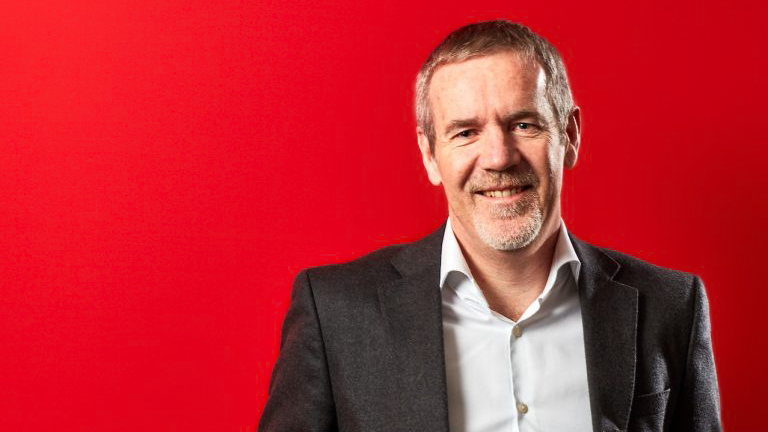Vodafone CTO reveals 4 ways 5G will transform MNOs
Scott Petty, CTO at Vodafone UK, has revealed how 5G is set to transform how Mobile network operators (MNOs) will evolve in a recent panel discussion.

At the recent 5G World Summit, a group of industry experts discussed how 5G could redefine telecoms companies over the next few years. Vodafone UK’s CTO, Scott Petty, was on the panel, and he revealed what Vodafone’s vision for a connected future looks like, and how mobile network operators (MNOs) are going to evolve to become service providers, as well as network specialists.
"There’s real momentum behind it as all four mobile operators are now rolling out services, and we’re starting to see really good traction in the market."
Scott Petty, Vodafone UK.
“We launched 5G more than a year ago now and it’s been very exciting seeing all the development around this new technology,” Petty said. “There’s real momentum behind it as all four mobile operators are now rolling out services, and we’re starting to see really good traction in the market. New use cases and capabilities are being developed all the time.”
Over the past 12 months Vodafone has launched innovation centres, and is working with the government in the UK to support technology incubators, too.
“At Vodafone, we really believe 5G will be the key to reviving the UK economy in the wake of the coronavirus pandemic,” Petty explained. “It could ensure that the economic benefits of innovation reach all parts of the country, not just the prosperous south-east.”
Here we’ve listed four key takeaways from the 5G World Summit event, as Petty explains the impact 5G will have over the next year and beyond.
1. From hardware to software
"We’re going to expand from being a network service provider to a company that is also a software and IT business. Because as we continue to virtualise and move to cloud-based technologies – think of Open RAN and Software Defined Networking – we’re going to need more software development and engineering skills, not just networking skills."
2. Becoming integrators and app developers
"We’re no longer a telecoms company selling a service to an end customer, we’re working with a whole range of different providers."
Scott Petty, Vodafone UK.
Take the recent 5G mobile private network we’re building with Ford at their electric car factory in Essex – that requires these new software engineering skills and a different partnership model. We’re no longer a telecoms company selling a service to an end customer, we’re working with a whole range of different providers. Our flourishing Internet of Things business has really stood us in good stead in this regard. We are becoming integrators and developers of applications, not just runners of networks.
SIGN UP FOR E-MAIL NEWSLETTERS
Get up to speed with 5G, and discover the latest deals, news, and insight!
Proofs of concept are now turning into reality. As well as the Ford factory we’re building 5G mobile private networks (MPNs) for Centrica at one of their gas plants, and for Coventry University to facilitate interactive virtual teaching, amongst other 5G use cases. A couple of connected port projects are getting off the ground, too.
3. Connected everything
We’re seeing a big demand for MPNs, not always with standalone spectrum, but integrated into hybrid networks. It’s about providing security and reliability of service outside, and increasingly, inside buildings. Connected IoT sensors will monitor many office and factory operations as functions become increasingly automated. We’ll need to manage those sensor networks and offer services around how to interpret and respond to all the data they collect. These are fantastic business opportunities for us.
Connected health and connected agriculture are two other sectors that show great commercial promise as we move from pilot projects to full-scale deployment in the UK, partly supported by the Government’s innovation centres.
4. Cultural change
On the consumer side, 5G is currently about the latest handsets and faster download speeds. That will change when augmented and virtual reality applications start filtering through to the market next year, and when the devices evolve and become more plentiful. But the most exciting use cases are probably a few years away yet.
“To sum up, 5G is going to have a massively transformational impact on Vodafone UK, requiring new skills and a new innovation-based culture,” Petty concludes. “We’ll be a totally different company five years from now.”
- Discover the best 5G networks in the UK and US
- Get your hands on the hottest 5G phones
- Millimeter wave: the secret sauce behind 5G
- The complete guide to 5G security
- We reveal the latest 5G use cases
- Discover the truth behind 5G dangers
- 5G towers: everything you need to know
Dan is a British journalist with 20 years of experience in the design and tech sectors, producing content for the likes of Microsoft, Adobe, Dell and The Sunday Times. In 2012 he helped launch the world's number one design blog, Creative Bloq. Dan is now editor-in-chief at 5Gradar, where he oversees news, insight and reviews, providing an invaluable resource for anyone looking to stay up-to-date with the key issues facing 5G.

